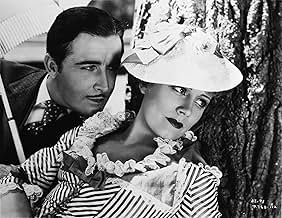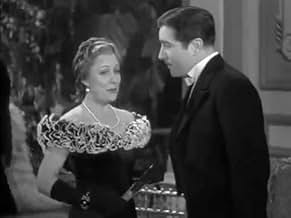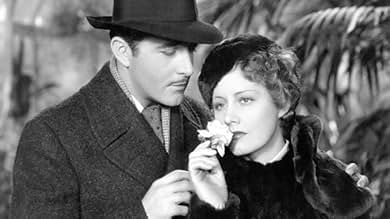Füge eine Handlung in deiner Sprache hinzuAn engaged attorney and a divorcee fall for each other in 1870s Manhattan.An engaged attorney and a divorcee fall for each other in 1870s Manhattan.An engaged attorney and a divorcee fall for each other in 1870s Manhattan.
- Auszeichnungen
- 3 wins total
Barry O'Moore
- Mr. Welland
- (as Herbert Yost)
Lowden Adams
- Jenkins
- (Nicht genannt)
Muriel Barr
- Miss Allison - Jenkins' Daughter
- (Nicht genannt)
Harry Beresford
- Museum Guard
- (Nicht genannt)
Lynn Browning
- Miss Archer
- (Nicht genannt)
Herbert Bunston
- W.J. Letterblair
- (Nicht genannt)
Bess Flowers
- Child's Mother
- (Nicht genannt)
Alf James
- Man Who Comes with Chairs
- (Nicht genannt)
John Merton
- John
- (Nicht genannt)
Empfohlene Bewertungen
I just watched The Age of Innocence and although it is a good movie, I wish it were made in color. The Ladies costumes were great and Irene Dunn looks amazing. I have one question, did men in the 1870s wear clothing that were styled much later? John Boles' fedora and suits stepped right out of the 1930s.
I have seen Scorsese's film many times and have always loved the luxurious attention to detail, but always thought Mae was miscast and there wasn't much humor, it was more of a melodramatic romance than a statement on values and morals of the time, so I was hesitant to watch this version, figuring it would be boring and predictable...
Instead, I was pleasantly surprised, this film actually had the depth, humor and awareness that I did not find in Scorsese's film. The movie is also remarkably adult for its time, and totally believable as well as faithful to the novel; the dialog was crisp, quick and mature and the story moved along steadily.
Nobody seems miscast or out of place and unlike other reviewers, I didn't find any problem with John Bole's performance, I thought he conveyed exactly what he was supposed to and was even less wimpy than Daniel Day-Lewis's performance in the Scorsese film.
Overall I recommend this version highly, and while I do prefer the pace of this film, it will never compare to the visual sumptuousness of the Scorsese version.
Instead, I was pleasantly surprised, this film actually had the depth, humor and awareness that I did not find in Scorsese's film. The movie is also remarkably adult for its time, and totally believable as well as faithful to the novel; the dialog was crisp, quick and mature and the story moved along steadily.
Nobody seems miscast or out of place and unlike other reviewers, I didn't find any problem with John Bole's performance, I thought he conveyed exactly what he was supposed to and was even less wimpy than Daniel Day-Lewis's performance in the Scorsese film.
Overall I recommend this version highly, and while I do prefer the pace of this film, it will never compare to the visual sumptuousness of the Scorsese version.
THE AGE OF INNOCENCE (RKO 1934) (81 minutes)
There have been three film versions of Edith Wharton's most renowned novel, The Age of Innocence. The 1924 silent version is lost. We are left with Martin Scorcese's definitive 1993 version in wide screen and color, derived from the novel itself with its multitude of characters and subplots, and this charming early talkie, based on a play version of the book.
Although the plot and narrative have been pared down considerably, the meat of the matter is still here and it is given first class treatment. Irene Dunne is radiant (when was she not?) in the role of the expatriate family member, Ellen, married into European royalty, and returned to 1870s New York Society, and John Boles gives a solid reading of the tortured Newland, a young lawyer betrothed to marry May Mingott, an innocent ingenue, while falling in love with her cousin, the experienced Ellen. It is true melodrama, a touching and tragic love story, played out in lush Hollywood style.
The sets are excellent as is the detailed and creative costume design. Helen Westley, in but 9 scenes, steals the show as the wise and down to earth Granny Mingott, while Julie Haydon over emotes as the clueless May. Max Steiner's score relies heavily on Tchaikovsky, whose song, None But The Lonely Heart, serves as the main motif running throughout the film. Mason and Heerman, who had just won a Screenplay Oscar for Little Women, deliver a marvelous adaptation, as they would for many more novels, including Magnificent Obsession, Imitation of Life, Golden Boy, and Stella Dallas. There is a long and frantic montage at the film's beginning, establishing the mood of Jazz Age madness and scandalous headlines, against which the calm staidness of New York 19th century society will be played out.
Westley and Dunne would appear opposite each other two years later in SHOW BOAT, while Laura Hope Crewes (as Mrs. Welland) and costume designer, Walter Plunkett, would be paired for 1939's Gone With The Wind.
The available dvd print is impeccably crisp and clean. Although the categories had not yet been created in 1934, a supporting actress nod would be due Helen Westley and a costume design nomination is due Walter Plunkett, in my humble opinion.
If you love Wharton, you will enjoy both the Scorcese version and this lovely gem from Hollywood's golden decade.
There have been three film versions of Edith Wharton's most renowned novel, The Age of Innocence. The 1924 silent version is lost. We are left with Martin Scorcese's definitive 1993 version in wide screen and color, derived from the novel itself with its multitude of characters and subplots, and this charming early talkie, based on a play version of the book.
Although the plot and narrative have been pared down considerably, the meat of the matter is still here and it is given first class treatment. Irene Dunne is radiant (when was she not?) in the role of the expatriate family member, Ellen, married into European royalty, and returned to 1870s New York Society, and John Boles gives a solid reading of the tortured Newland, a young lawyer betrothed to marry May Mingott, an innocent ingenue, while falling in love with her cousin, the experienced Ellen. It is true melodrama, a touching and tragic love story, played out in lush Hollywood style.
The sets are excellent as is the detailed and creative costume design. Helen Westley, in but 9 scenes, steals the show as the wise and down to earth Granny Mingott, while Julie Haydon over emotes as the clueless May. Max Steiner's score relies heavily on Tchaikovsky, whose song, None But The Lonely Heart, serves as the main motif running throughout the film. Mason and Heerman, who had just won a Screenplay Oscar for Little Women, deliver a marvelous adaptation, as they would for many more novels, including Magnificent Obsession, Imitation of Life, Golden Boy, and Stella Dallas. There is a long and frantic montage at the film's beginning, establishing the mood of Jazz Age madness and scandalous headlines, against which the calm staidness of New York 19th century society will be played out.
Westley and Dunne would appear opposite each other two years later in SHOW BOAT, while Laura Hope Crewes (as Mrs. Welland) and costume designer, Walter Plunkett, would be paired for 1939's Gone With The Wind.
The available dvd print is impeccably crisp and clean. Although the categories had not yet been created in 1934, a supporting actress nod would be due Helen Westley and a costume design nomination is due Walter Plunkett, in my humble opinion.
If you love Wharton, you will enjoy both the Scorcese version and this lovely gem from Hollywood's golden decade.
Irene Dunne shines in this fine(one must remember it was the post-code 1930s)adaptation of the Edith Wharton novel, as Countess Ellen Olenska, an american born member of New York's high society, who was raised and married in Europe, far way from that city's strict society conventions, now an outsider in her own family. She returns to New York city because she wants to divorce her polish aristocrat husband, where she falls in love with young lawyer Newland Archer, her cousin's fiancé.
John Boles, as usual, is just so-so as Newland Archer, although I must say, that upon watching the movie I felt he was much more effective when impersonating him in his old age. This actor always reminds me of Robert Taylor, because although the latter achieved superstar stardom and had better looks, their acting abilities and inexpressiveness are roughly equivalent. As well, both served as "escorts" in many star vehicles of notable 1930s female stars: Irene Dunne, Barbara Stanwyck, etc.
Miss Dunne, an excellent comedienne and dramatic actress, had previously worked with Boles in the 1932 weepie "Back Street", and this film's plot is in the same category. She looks very beautiful indeed in period clothing. Julie Haydon is rightly "controlled" and restrained, as her cousin May.
Helen Westley gives the greatest performance among the supporting players, as Old Dowager Mrs. Manson Mingott, both Countess Olenska's and May's understanding and very warm grandmother. Laura Hope Crews is very good as Dunne's stuffy and very concerned aunt (and May's mother), and Lionel Atwill plays an unscrupulous "married man of bad reputation" who befriends Dunne, in spite of the scandal it may cause, in the opinion of her family.
Recommended viewing for '30s movie fans.
John Boles, as usual, is just so-so as Newland Archer, although I must say, that upon watching the movie I felt he was much more effective when impersonating him in his old age. This actor always reminds me of Robert Taylor, because although the latter achieved superstar stardom and had better looks, their acting abilities and inexpressiveness are roughly equivalent. As well, both served as "escorts" in many star vehicles of notable 1930s female stars: Irene Dunne, Barbara Stanwyck, etc.
Miss Dunne, an excellent comedienne and dramatic actress, had previously worked with Boles in the 1932 weepie "Back Street", and this film's plot is in the same category. She looks very beautiful indeed in period clothing. Julie Haydon is rightly "controlled" and restrained, as her cousin May.
Helen Westley gives the greatest performance among the supporting players, as Old Dowager Mrs. Manson Mingott, both Countess Olenska's and May's understanding and very warm grandmother. Laura Hope Crews is very good as Dunne's stuffy and very concerned aunt (and May's mother), and Lionel Atwill plays an unscrupulous "married man of bad reputation" who befriends Dunne, in spite of the scandal it may cause, in the opinion of her family.
Recommended viewing for '30s movie fans.
Young Kane Richmond is coming to his grandfather John Boles for advice about
women. He's looking to marry a divorcee and the family is just buzzing. Except
for Grandpa and Richmond suspects something.
His suspicions prove correct as John Boles proceeds to tell him about his romantic youth in the Gilded Age when he passed up Irene Dunne who is in fact his sister-in-law. Neither of the two were ready to defy very strict conventions of the time that still held firm in some respects when this film was released. Divorce was a big no-no
Both the leads did well though I really couldn't see Lionel Atwill as anyone's romantic rival. Helen Westley as the grandmother came off best in the supporting cast.
Taken from an Edith Wharton novel the play by Margaret Ayer Barnes ran 207 performances on Broadway and starred the legendary Katherine Cornell. Now that I would have liked to see.
His suspicions prove correct as John Boles proceeds to tell him about his romantic youth in the Gilded Age when he passed up Irene Dunne who is in fact his sister-in-law. Neither of the two were ready to defy very strict conventions of the time that still held firm in some respects when this film was released. Divorce was a big no-no
Both the leads did well though I really couldn't see Lionel Atwill as anyone's romantic rival. Helen Westley as the grandmother came off best in the supporting cast.
Taken from an Edith Wharton novel the play by Margaret Ayer Barnes ran 207 performances on Broadway and starred the legendary Katherine Cornell. Now that I would have liked to see.
Wusstest du schon
- WissenswertesThe original Broadway production starred Katharine Cornell as Ellen Olenska, and Franchot Tone as Newland Archer.
- PatzerAs evidenced by a dated letter, Newland assisted Ellen with her divorce case in August 1879. Newland and May were married just after the following Easter, which would make it 1879. After returning from their honeymoon, they receive an invitation for a party on Wednesday, October 2nd. That would be correct if it was still 1878, but in 1879, October 2nd was a Thursday.
- Zitate
Julius Beaufort: After all your exquisite associations over there, how do you think you're going to like it here?
Ellen: I think it quite like heaven.
Julius Beaufort: Yes, I have that feeling too sometimes. You mean, just some place to go after you're dead?
- VerbindungenReferences Im Westen nichts Neues (1930)
- SoundtracksNone But the Lonely Heart
(1869) (uncredited)
Music by Pyotr Ilyich Tchaikovsky
Played during the opening credits and often as background music
Top-Auswahl
Melde dich zum Bewerten an und greife auf die Watchlist für personalisierte Empfehlungen zu.
- How long is The Age of Innocence?Powered by Alexa
Details
- Erscheinungsdatum
- Herkunftsland
- Sprachen
- Auch bekannt als
- La edad de la inocencia
- Drehorte
- Produktionsfirma
- Weitere beteiligte Unternehmen bei IMDbPro anzeigen
- Laufzeit
- 1 Std. 21 Min.(81 min)
- Farbe
- Seitenverhältnis
- 1.37 : 1
Zu dieser Seite beitragen
Bearbeitung vorschlagen oder fehlenden Inhalt hinzufügen

































